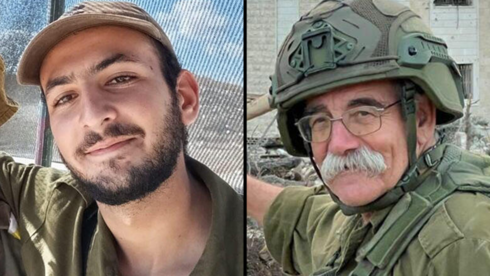By Yoav Zitun, Roni Green Shaulov
Copyright ynetnews

The Military Advocate General’s Office announced Thursday it intends to file an indictment, pending a hearing, against Col. (res.) Yoav Yarom, a former chief of staff of the Golani Brigade, over his involvement in the deaths of Sgt. Gur Kehati and Israeli historian Ze’ev (Jabo) Erlich in Lebanon last November. Prosecutors are expected to charge Yarom with reckless manslaughter, the offense for which he was initially investigated by the Military Police, though his defense team is expected to seek reduced charges at the hearing. Sgt. Kehati, 20, from Nir Banim, served as a combat soldier in Golani’s 13th Battalion. He was killed in November last year in fighting at an archaeological site in southern Lebanon, along with Erlich, 70, a researcher of the Land of Israel and one of the founders of the West Bank settlement of Ofra. A 13th Battalion officer was seriously wounded in the incident, and Yarom was moderately wounded. The army has completed its operational investigation of the case, but has yet to publish its findings. Days after the incident, Yarom announced he would step down, saying: “In light of the values I was raised on and taught, I believe I must take command responsibility for the event.” Kehati’s family said in a statement: “The bereaved family was informed of the decision to indict Col. (res.) Yoav Yarom, subject to a hearing, for reckless manslaughter. In the family’s eyes, the decision is necessary given his negligent and criminal conduct that caused the tragedy. This will not bring back Gur, but we hope it will deter others in the future. The family has not yet been updated on criminal steps that may be taken against other officers involved in the incident.” Erlich, who had held the rank of major in the reserves, continued volunteering until age 70 but entered Lebanon as a civilian, according to the army. The IDF decided to recognize him as a fallen soldier and grant him a military burial. He is survived by his wife, Tamar, six children and grandchildren. His son Yigal Amitai told Ynet: “It is clear from the statement that our father’s entry into Lebanon was by invitation and authorization of the approving officer, who had full authority, after many years of shared work across various IDF theaters.” The incident The unusual event occurred on Nov. 20 last year, around 3 p.m., during the ground operation Israel was conducting in Lebanon under the 36th Division, about 4 miles from the border in an area overlooking Tyre and the coastal plain. Yarom, who had lost a leg in combat in Lebanon as a young company commander, arrived at the location where a Golani soldier had been killed earlier that week. He was accompanied by Erlich, who carried a personal weapon and appeared to be wearing uniform and protective gear. The two began surveying an ancient fortress near a mosque on a ridge, unaware that two Hezbollah terrorists had been hiding there for several days. The army later said their presence at the site defied orders and defined it as “a severe and improper incident.” The terrorists opened fire at close range, killing Erlich and Kehati. Kehati’s family said he was killed while securing Erlich’s entry into the fortress, which they described as an unjustified “private tour” arranged by the army in a combat zone. They accused the Military Police of failing to question soldiers who had witnessed the incident. Yarom, who knew Erlich from his earlier service as commander of the Samaria Brigade in the West Bank, said he invited him “for operational reasons, to help understand the fortress and ensure no fighters were inside as we suspected.” He claimed Erlich arrived in military attire with helmet, ceramic vest and personal weapon, leading him to believe he had been mobilized into service. Family meetings with IDF leadership About three months after the incident, Kehati’s family met with then-IDF chief of staff Herzi Halevi. “It was a long meeting and he took full responsibility for what he called a very bad and unusual event,” the family said. “He promised to do everything possible to ensure a thorough investigation and truth-finding.” The family said Halevi acknowledged that bringing a civilian into a combat mission in Lebanon required strict procedure and admitted “this was not done as expected.”



